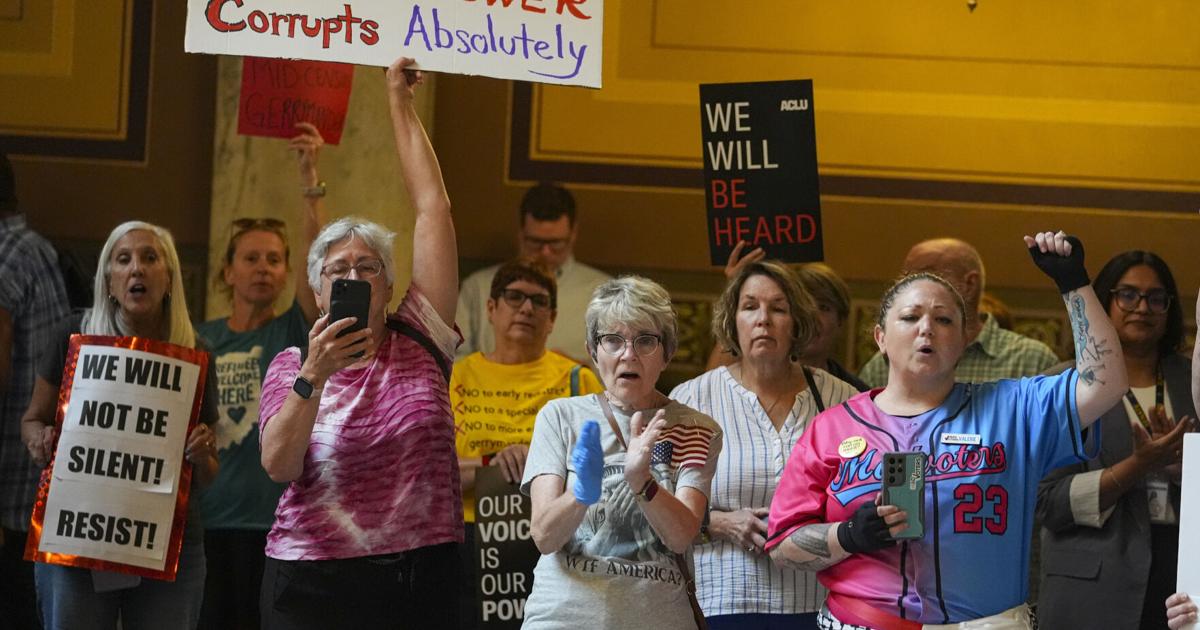I certainly didn’t have Indiana embroiled in a debate over new congressional maps on my 2025 bingo card, but here we are.
My unsolicited advice to Republicans considering the likely unprecedented move: Make the case. Give me population and demographic data that shows the maps must change immediately then convince me how it will help Hoosiers.
Not how it helps President Donald Trump — Hoosiers.
At this point, no one is doing that, which makes crystal clear this is simply partisan politics.
Some politicians have called out Democrats in other states with gerrymandered maps, such as Illinois.
Gov. Mike Braun made that case in an interview with the Indiana Capital Chronicle on Tuesday:
“But the other side of the aisle, I think, have mastered gerrymandering by looking at their maps. And I think it’s a little bit maybe hypocritical that they’re now so kind of sanctimonious about it. I don’t know that they would hesitate if things were reversed.”
And, a few minutes later: “But again, I’d like to stress that the most gerrymandered maps in the country are among blue states.”
But here’s the problem: Both sides gerrymander.
This year’s discussion started in Texas, which no one would call a blue state. And I don’t care about the maps in another state. I care about Indiana’s map, the process used to create it and its impact on Hoosier voters.
My mom taught me that two wrongs don’t make a right. We’ll never get anywhere as a society if the justification for doing wrong is “they did it first.” And this can be said about a host of public policy issues.
I was heartened to see some well-respected Republicans say just that.
Sen. Spencer Deery, R-West Lafayette, released a statement condemning the idea.
“What we are being asked to do goes far beyond the partisan map fights that happen every 10 years across the country. Rationalizing a mid-cycle redistricting by saying, ‘Democrats gerrymander too’ is an empty and irrelevant excuse,” he said. “Instead, we are being asked to create a new culture in which it would be normal for a political party to select new voters, not once a decade — but any time it fears the consequences of an approaching election.
“That would clearly violate the concept of popular sovereignty by making it harder for the people to hold their elected officials accountable and the country would be an uglier place for it.”
Deery is the latest in a line of GOP lawmakers speaking out against redistricting — my running tally is seven now.
Republican House Speaker Todd Huston and Senate President Pro Tempore Rodric Bray ran a good process in 2021, drafting maps with 14 hearings all around the state — from Sellersburg to Valparaiso. Nine of those hearings didn’t have proposed maps because the pandemic delayed data collection and analysis.
In 2011, the process was just as robust — with hearings in nine cities taking citizen input.
Now, of course, that doesn’t mean the maps are perfect. There will always be criticism. You can’t keep every community together and they do favor Republicans more than recent Democratic turnout in statewide elections would indicate. But if you look at it, it’s a map that makes sense.
Huston and Bray generally run their chambers cleanly and try to instill respect in the institution. A mid-decade redistricting process would erode that.
Best case scenario, it would involve a few hearings in Indianapolis only over a week or two. Worst case: They would come in with preordained maps, suspend all rules and approve them in one day.
Indiana lawmakers are better than either option.
Niki Kelly is editor of the Indiana Capital Chronicle, where this originally appeared. She covered the Statehouse for The Journal Gazette from 1999 to 2022.
